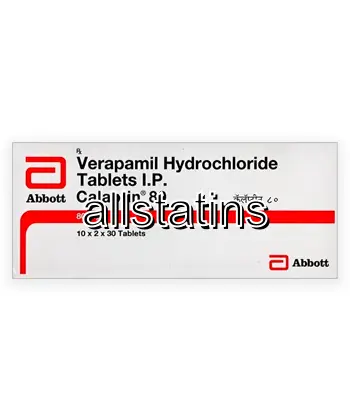| Package | Dosage | Price | Price per Dose | |
|---|---|---|---|---|
| Dosage: 40mg | ||||
| 270 pill | 40mg | $96.86 | $0.36 | |
| 120 pill | 40mg | $53.80 | $0.45 | |
| 90 pill | 40mg | $44.83 | $0.50 | |
| 60 pill | 40mg | $35.86 | $0.59 | |
| Dosage: 120mg | ||||
| 270 pill | 120mg | $218.85 | $0.81 | |
| 120 pill | 120mg | $109.42 | $0.91 | |
| 90 pill | 120mg | $89.68 | $1.00 | |
| 60 pill | 120mg | $71.74 | $1.20 | |
| 30 pill | 120mg | $46.63 | $1.56 | |

Verapamil Hydrochloride Description
Overview of Verapamil Hydrochloride
Verapamil Hydrochloride is a medication widely used in the treatment of various cardiovascular conditions. It is classified as a calcium channel blocker, which means it works by relaxing the muscles of the heart and blood vessels. This helps to lower blood pressure and improve blood flow. Many patients and healthcare providers consider it an effective option for managing hypertension, angina, and certain heart rhythm disorders. Its ability to influence the movement of calcium ions in cardiac and vascular smooth muscle cells makes it a vital tool in cardiology. The drug is typically available in tablet form and has a well-established safety profile when used as directed.
How Verapamil Works
Verapamil acts by blocking calcium channels in the cell membranes of the heart and blood vessels. Calcium is essential for the contraction of cardiac and smooth muscle tissue. By inhibiting calcium entry, the medication reduces the force of heart contractions and dilates the arteries. This dual action results in lowered blood pressure and decreased workload on the heart. Patients with angina benefit from improved oxygen supply to the heart muscle, reducing the frequency and severity of angina attacks. Additionally, Verapamil can help regulate abnormal heart rhythms by slowing down electrical conduction in the atrioventricular node.
Uses and Benefits
This medication is primarily prescribed for treating hypertension, helping to prevent strokes, heart attacks, and kidney problems caused by high blood pressure. It is also effective in managing angina pectoris, a condition characterized by chest pain due to restricted blood flow to the heart. Furthermore, Verapamil is used in the treatment of certain arrhythmias, including supraventricular tachycardia. Many users report a noticeable improvement in their symptoms and overall quality of life after starting therapy. Its oral form makes it convenient for daily administration, and it often assists patients in maintaining stable blood pressure levels over time.
Possible Side Effects and Precautions
While Verapamil Hydrochloride is generally well tolerated, some individuals may experience side effects. Common adverse reactions include dizziness, headache, constipation, and flushing. In some cases, patients might notice swelling of the ankles or a slow heart rate. Serious side effects, although rare, can involve heart failure or severe hypotension. It is especially important for individuals with existing heart conditions, liver problems, or those taking other medications to consult their healthcare provider before starting treatment. Regular monitoring and dose adjustments may be necessary to minimize risks and maximize benefits.
Patient Considerations
Patients are advised to follow their prescribed dosage carefully and not to adjust their intake without medical approval. Alcohol consumption should be limited, as it can enhance the blood pressure-lowering effects and increase the risk of side effects. Pregnant or breastfeeding women should discuss the potential risks with their doctor. It is also crucial to inform healthcare providers about all current medications to avoid interactions. Maintaining a healthy lifestyle, including diet and exercise, alongside medication can enhance treatment outcomes. Regular check-ups are essential to evaluate the effectiveness and adjust the therapy as needed.